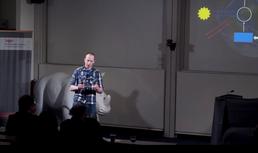TEDx: Closing the Loop: Entropy Accounting for a Sustainable World
- Homepage
- http://tedxtalks.ted.com/video/The-legacy-of-Sadie-Carnot-Stua;search%3Astuart%20bartlett
- Started
- 11th February 2013
- Ended
- 17th March 2013
- Investigators
- Stuart Bartlett
Where does our energy come from? Where does it go? And how long will it last? For highly evolved natural ecosystems, the answers to these questions are clear. And crucially, the answer to the final question is: “As long as the Sun shines”. What about modern human society? To solve this problem we have to think about our definition of energy and more importantly whether the value or usefulness of energy can change. I will show that in fact not all energy is equal. Some forms are more useful than others, so we do not actually consume energy, we rather consume its ‘usefulness’. Plants are able to take the rich, useful energy from Sunlight and use it to construct complex molecules from simpler building blocks. That stored chemical energy is then harnessed by other organisms to grow and reproduce. When organisms use that useful energy it ends up being transformed into a diffuse and less useful form, such as background heat. That heat is then radiated away, eventually back into space in a much more spread out, poorer form than the UV rays that it originally existed as. So living systems have long been able to harness useful energy and use it to power all the processes which sustain them. How do our own dealings with energy compare? How do we extract useful energy and what happens when we’re finished with it? Using the ideas of a French military engineer who died over 200 years ago, I will explain the basic energetic workings of the natural world. I’ll argue that our definition of waste needs fundamental modification and illuminate the future prospects for our current modus operandi.
Categories
Life sciences simulation: Systems biology
Physical Systems and Engineering simulation: Energy
Socio-technological System simulation: Human environment interaction
Transdisciplinary tags: Complex Systems
